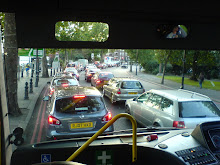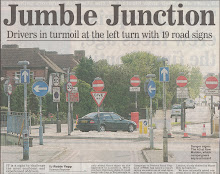Monday, 25 August 2008
Dangerous rules of the road
A classic example of the rules setting the stage for conflict. I was in Brighton (Hove) trying to turn right from a "side" road into a main road. DfT guidance says conflict points should be minimised, but if you're trying to exit from a side road, you face conflict from both sides. I began to nose out to see past the line of parked cars to my right. Nothing coming, so I look left, and someone is bang in front of me, inches away, turning right across me, gesticulating. Don't let me go first, will you, even though it’s good-mannered and much easier for you to give way to a right-turner whose view is restricted. Again I start inching out, and whoosh! another car travelling at an inappropriate but legal speed goes uncomfortably close. If roads were fit, if all road-users had equal rights, people would show consideration and take it in turns. In a sense, those aggressive drivers are not to blame. They are just following the rules of the road, which create war zones with battle lines drawn by policymakers. They f*** us up, the engineers. They may not mean to, but they do.
Injustice system
“Instant justice is creating a nation of criminals”, says a report by Professor Rod Morgan, former chief inspector of probation and ex-chair of Youth Justice Board. He warns that increasing use of fixed penalty notices is leading to criminal records for minor matters such as fare dodging, while serious violent offenders receive cautions. Analagously, the rules of the road kill and criminalise us, while the unaccountable perps in the traffic control dictatorship continue to lord it over us to our detriment.
Tragic traffic management
Tom says driving is a complex task, but seems to blame human inability to concentrate or cope. I’ve always advocated phasing in the advanced driving test, but for my money the original sin is fatuous traffic regulation bolstered by barbaric road design and a culture of coercion, blame and enforcement. Traffic "experts" manufacture an alien environment which interferes with our innate ability to negotiate safe and efficient movement - in Ken Todd's phrase, it's "an exercise in self-defeat". After they tie us in knots, we are left to carry the can. It would be a farce if it wasn't a tragedy.
Sunday, 24 August 2008
Tom Vanderbilt's Traffic
Observer review of Tom Vanderbilt’s Traffic concludes that "most of our traffic problems come down to the innate weakness of our species – inability to judge risk, thrill-seeking ... greed." The book must be more subtle, but in response I reiterate my point that if you remove the unfit priority rule, you’ll make roads fit for people and peaceful coexistence will break out.
Carping about parking
On the back of a Brighton bus was this from a 2006 RAC report: 28% of motorists drive an extra 20 minutes in search of parking. Presumably it’s intended as an argument for going by bus. Or is it a case for making parking easier? Not everyone can suddenly start going by bus. A bus can’t do door-to-door or enable multiple trips with equipment. If parking were less restricted, there would be an immediate drop in fuel use and emissions from 10m motorists x 365 days a year. Or is it better to continue punishing the people and the planet?
Friday, 22 August 2008
Lights = trouble. No lights = no trouble
Dead red time
With the unquantifiable dead red time it generates, the traffic control system is inefficient. By making us watch lights and cameras rather than the road, it's dangerous. Far from easing the task of negotiating movement safely on busy roads and streets, the system's battery of control adds to it, unnecessarily and vexatiously. After the predators catch us in one of their traps, they criminalise and penalise us. Endless instructional and warning signs distract and unsettle us – BUT WHERE ARE THE DIRECTIONAL SIGNS WHEN WE NEED THEM!?
Wednesday, 13 August 2008
Nudge theory
Below is another piece about "nudge" theory. It also applies to traffic and the public realm, and supports the idea that coercion and control are less effective than freedom of choice and well- designed streets which encourage rather than try to dictate positive behaviour.
http://www.ft.com/cms/s/0/a050b970-68cf-11dd-a4e5-0000779fd18c.html
http://www.ft.com/cms/s/0/a050b970-68cf-11dd-a4e5-0000779fd18c.html
Wednesday, 6 August 2008
Con charge
The charge does nothing to reduce danger and delay on roads plagued by priority rules and traffic lights. Imposed before deregulation was even tried, it's premature. TfL admits failure http://www.guardian.co.uk/politics/2008/aug/06/congestioncharging.transport but still deflects blame, citing the usual suspects – roadworks, volume of traffic. When will people realise that lights are the under-reported cause of urban congestion? If you remove priority, you remove the "need" for lights and the need for speed, enabling everyone to filter. That’s how to maximise road safety and capacity, and to minimise congestion.
Monday, 4 August 2008
Retro car tax
What do I think about the retrospective road tax? Contemptible is one word that springs to mind. For years, I (and no doubt others) have been calling for government to subsidise alternative fuel research, and, partly through taxation, to steer future buying habits towards greener choices (not just for cars, but buses, taxis, trucks, the lot). OK, sections of the public have been slow to wise up, but the government has been so remiss in taking action that the retrospective tax seems a wheeze to make up for lost time. It will punish the less well-off, who won’t be able to afford a new, greener car, and won’t be able to sell their old one ... OK, the Environmental Audit Committee is addressing some of these concerns. They say a car scrappage scheme should be considered to offer drivers of high emissions cars a payment to trade in their vehicles for more efficient models. But will the government listen? Maybe, if enough of us shout, "We're not going to take it anymore!" Meanwhile, it continues to support a multi-billion traffic control system that causes congestion and accidents, and costs the earth to install and run.
Subscribe to:
Posts (Atom)


















